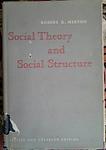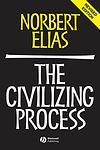10 Most Influential Books by the ISA
This is one of the 291 lists we use to generate our main The Greatest Books list.
-
Economy and Society by Max Weber
"Economy and Society" is a comprehensive analysis of the relationship between economy and society, focusing on the role of social actions and their impact on economic systems. The book presents a theoretical framework for understanding how economic and social structures influence each other, including the role of bureaucracy, power, and authority. The author also introduces his famous concept of the "Protestant Ethic", linking the rise of capitalism to certain aspects of Christian beliefs. The book is considered a fundamental text in sociology and economics, providing a deep understanding of social and economic phenomena.
-
The Sociological Imagination by Charles Wright
"The Sociological Imagination" is a seminal work that challenges readers to understand the relationship between individual experiences and the wider society. The book argues that one's personal issues are often linked to broader social and historical forces. It emphasizes the importance of adopting a sociological perspective to analyze how societal structures, such as class inequality and cultural norms, influence personal choices and opportunities. By doing so, it encourages individuals to see the connection between their personal lives and the larger social context, thereby fostering a deeper understanding of both.
-
Social Theory And Social Structure by Robert K. Merton
"Social Theory and Social Structure" explores the frameworks and mechanisms of social sciences, emphasizing the complex interplay between social structure and individual behavior. The book introduces key concepts such as the "self-fulfilling prophecy" and "role model," which have become fundamental in sociology. It delves into the structural-functional analysis, examining how societal norms influence behaviors and institutions, and discusses the unintended consequences that can result from social actions. This work is influential in the field of sociology, providing critical insights into the dynamics of social systems and their impact on various social phenomena.
-
The Protestant Ethic and the Spirit of Capitalism by Max Weber
This book is a sociological study that explores the relationship between the ethics of ascetic Protestantism and the emergence of the spirit of modern capitalism. The author argues that the religious ideas of groups such as the Calvinists played a role in creating the capitalistic spirit. The work is noted for its rigorous methodology and its contribution to the broader understanding of the origins and development of capitalism. It has been widely influential across social sciences, especially in sociology and economics.
-
The Social Construction Of Reality by Peter Berger, Thomas Luckmann
The book explores how individuals and groups create and maintain societal norms and values through their interactions, shaping reality through a process called social construction. It delves into the mechanisms by which knowledge and understanding of the world are collaboratively built, emphasizing the role of language and communication in this process. The authors argue that the reality perceived by a society is a complex interplay of historical, cultural, and social factors, which are continuously reconstructed and reinforced through social practices. This work provides a foundational analysis of the sociology of knowledge, examining how subjective meanings become objective elements of culture and influence human behavior and social institutions.
-
Distinction by Pierre Bourdieu
"Distinction" is a sociological analysis that explores the ways in which the tastes and preferences of individuals are related to their social positions and the structures of power within society. The book argues that aesthetic choices, ranging from music and art to food and drink, are not just indicators of personal preference but are deeply intertwined with social class and the distinctions that classes make to set themselves apart from others. Through a detailed examination of French society, the author demonstrates how cultural consumption patterns are formed and how they function as markers of social status, contributing to the reproduction of social hierarchies and class relations.
-
The Civilizing Process by Norbert Elias
"The Civilizing Process" is a sociological treatise that explores the development of manners, changes in behavior, and the evolution of social norms from the medieval period to the early modern era in Western Europe. The book argues that the transformation in social codes, particularly around violence and the regulation of impulses, is closely linked to the formation of state power and the monopolization of physical force. Through a detailed analysis of historical documents on etiquette, the author illustrates how the increasing pressures of social structures and interdependencies require more regulated forms of behavior, leading to what is described as the "civilizing process." This process, according to the author, reflects broader socio-political changes and is integral to understanding the dynamics of state formation and individual behavior regulation in European history.
-
The Theory Of Communicative Action by Jürgen Habermas
The book is a seminal work in social theory that explores the concept of communicative action, where individuals interact based on mutual understanding and pursue rational arguments, consensus, and cooperation rather than merely acting for individual success. The author critiques the instrumental and strategic action in modern societies and argues that communicative action is essential for maintaining the rationality and democratic nature of human interactions. The work delves into the structures of how language and social interaction form the basis of society and how distortions in communication can lead to social issues, emphasizing the importance of transparent and undistorted communication in achieving genuine understanding and societal cohesion.
-
The Structure Of Social Action by Talcott Parsons
"The Structure of Social Action" is a seminal work in sociology that lays the foundation for the author's theory of action based on the methodological principle of voluntarism and the epistemology of analytical realism. The book synthesizes the work of previous sociological giants, such as Max Weber, Émile Durkheim, and Vilfredo Pareto, arguing that despite their differing approaches, these thinkers essentially agreed on the necessity of a theory that integrates the individual actor's aims with the constraints of social systems. This integration forms a core argument for a unified structure of social action, which seeks to explain how social order is possible through the normative elements of social actions and institutions.
-
The Presentation Of Self In Everyday Life by Erving Goffman
This seminal sociological text examines the ways in which individuals shape their identities through interaction with others in society, likening everyday activities to a theatrical performance. The author argues that people present different "faces" or personas in various social contexts, managing impressions to control how they are perceived by others. Through this lens, the book explores concepts such as the front stage and back stage of personal performance, the use of props and settings, and the collaborative nature of social interactions. The work provides a framework for understanding the intricacies of social life and the subtle art of personal presentation.
ISA (International Sociological Association), 10 Books
One of the major aims of the ISA World Congress of Sociology held in Montreal 1998, was to make a critical assessment of sociological heritage of the twentieth century. In this framework the ISA Congress Programme Committee carried on in 1997 an opinion survey in order to identify ten most influential books for sociologists. ISA members were asked to list five books published in the twentieth century which were most influential in their work as sociologists. 16% of ISA members (455 out of 2785) participated in the survey
Added 14 days ago.
This list has a weight of 60%. To learn more about what this means please visit the Rankings page.
Here is a list of what is decreasing the importance of this list:
- List: only covers 1 specific genre
- List: criteria is not just "best/favorite"
If you think this is incorrect please e-mail us at [email protected].









